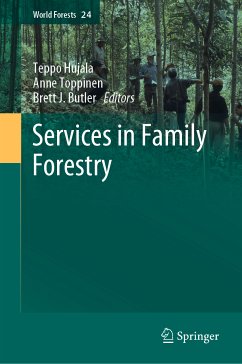Conceptual foundations of service dominant logic (S-D logic) will introduce the reader to the service research lenses, through which the subsequent chapters scrutinize services designed and offered to family forest owners. These publicly funded or market services typically help owners fulfil various land ownership objectives through forest management. Increasingly, these services are helping landowners to secure and improve ecosystem services provision from their forests and helping to meet demands from the various stakeholders.
While the book essentially approaches services as a continuous, value co-creation activity by forest owners and service providers, it recognizes and analyses the role of supporting institutions and policy frameworks in service evolution. Moreover, the book takes a step further by contemplating the wider societal transitions that may be required to enable service ideas to become service innovations as part of paradigmatic changes of markets, entrepreneurship, and customer behavior that help society move towards more sustainable and responsible bio-based economy.
Dieser Download kann aus rechtlichen Gründen nur mit Rechnungsadresse in A, B, BG, CY, CZ, D, DK, EW, E, FIN, F, GR, HR, H, IRL, I, LT, L, LR, M, NL, PL, P, R, S, SLO, SK ausgeliefert werden.









